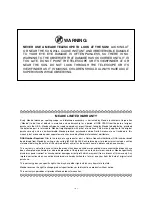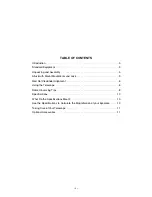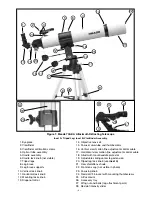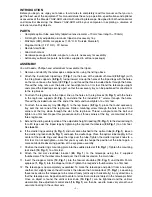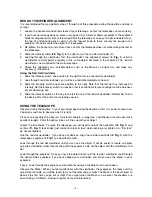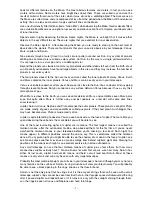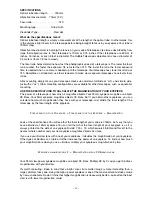
– 5 –
INTRODUCTION
Before you begin, we urge you to take a few minutes to completely read this manual so that you can
get the best use of the equipment. This manual details the set-up, operation, specifications and optional
accessories of the Meade 70-AZ-ADR altazimuth refracting telescope. Designed for both astronomical
and terrestrial observing, the Meade 70-AZ-ADR will be your companion in exploring a universe of
celestial and earthly objects.
PARTS
•
Complete optical tube assembly (objective lens diameter = 70mm; focal length = 700mm)
•
Full-length, fully adjustable, aluminum tripod and accessory tray.
•
MA25mm (28X), MH9mm eyepieces (1.25" O.D. “Outside Diameter”)
•
Diagonal mirror (1.25" O.D.), 2X barlow
•
Red dot viewfinder
•
Altazimuth mount
•
Hardware package with bolts, wingnuts, nuts, etc. necessary for assembly
•
Astronomy software (separate instructions supplied in software package)
ASSEMBLY
You will need a Phillips-head screwdriver to assemble the tripod.
1.
Remove and identify the telescope’s components, using the listing above.
2.
Attach the 3 aluminum tripod legs (
7, Fig. 1
) to the base of the altazimuth mount (
25, Fig. 1
) with
the 3 leg brace supports (
8, Fig. 1
) facing inward. Line up the holes of the tripod legs with the holes
on the mount base attachment (
27, Fig. 1
) and thread the three included bolts through the holes.
Thread the wing nuts over the bolts and hand-tighten to a firm feel. Stand the telescope upright
and spread the tripod legs evenly apart so that the accessory tray can be positioned for attachment
to the leg braces.
3.
To attach the leg braces to the tripod, line up the holes in the leg braces (
9, Fig. 1
) with the holes
in the leg brace supports (
8, Fig. 1
) and slide the the included 1/2” screws through the holes.
Thread the included nuts over the end of the bolts and hand-tighten to a firm feel.
4.
To attach the accessory tray (
26, Fig. 1
) to the leg braces (
9, Fig. 1
), place the round accessory
tray over the over one of the leg braces. Slide a mounting screw through the hole in one of the
corners of the tray, down through the slot in the leg brace. Thread a wingnut onto the bolt and
tighten to a firm feel. Repeat this procedure until all three corners of the tray are mounted to the
three leg braces.
5.
Extend the sliding center portion of the adjustable height tripod leg (
19, Fig. 1
) to the desired length
for all 3 legs. Lock the tripod legs by tightening the leg lock thumbscrew (
20, Fig. 1
) to a firm feel.
See
Inset A
.
6.
If the cradle ring assembly (
5, Fig. 1
) did not come attached to the optical tube (
4, Fig. 1
), loosen
the cradle ring lock knob (
6, Fig. 1
) and open the cradle rings. Place the optical tube roughly in the
center of the cradle rings and close the rings over the tube. Tighten the cradle ring lock knobs to a
firm feel. Do not overtighten—note that you may wish to change the position of the tube to gain a
more comfortable observing position of the eyepiece assembly.
7.
Position the cradle ring’s mounting plate into the saddle plate slot (
18, Fig. 1
). Tighten the mounting
lock knob (
12, Fig. 1
) to a firm feel.
8.
Attach the red dot viewfinder bracket (
24, Fig. 1
) to the telescope using the 2 supplied
thumbscrews. The thumbscrews thread over the 2 bolts located on the main tube.
11. Insert the diagonal mirror (
13, Fig. 1
) into the focuser drawtube (
15, Fig. 1
) and the MA 25mm
eyepiece (
1, Fig. 1
) into the diagonal mirror. Tighten the respective thumbscrews to a firm feel.
12. The telescope is now completely assembled. To move the telescope and point it from one object
another, first slightly loosen the vertical lock, then loosen the horizontal lock (
11, Fig. 1
). Loosening
these locks allows the telescope to be moved freely (vertically or horizontally) in any direction so
that the telescope can be positioned to center a terrestrial or celestial object in the telescopic field.
Once an object is found, the vertical lock knob (
10, Fig. 1
) can be tightened and the vertical
slow-motion fine-adjustment control knob (
16, Fig. 1
) can then be used to make very smooth and
accurate tracking in the vertical axis.


